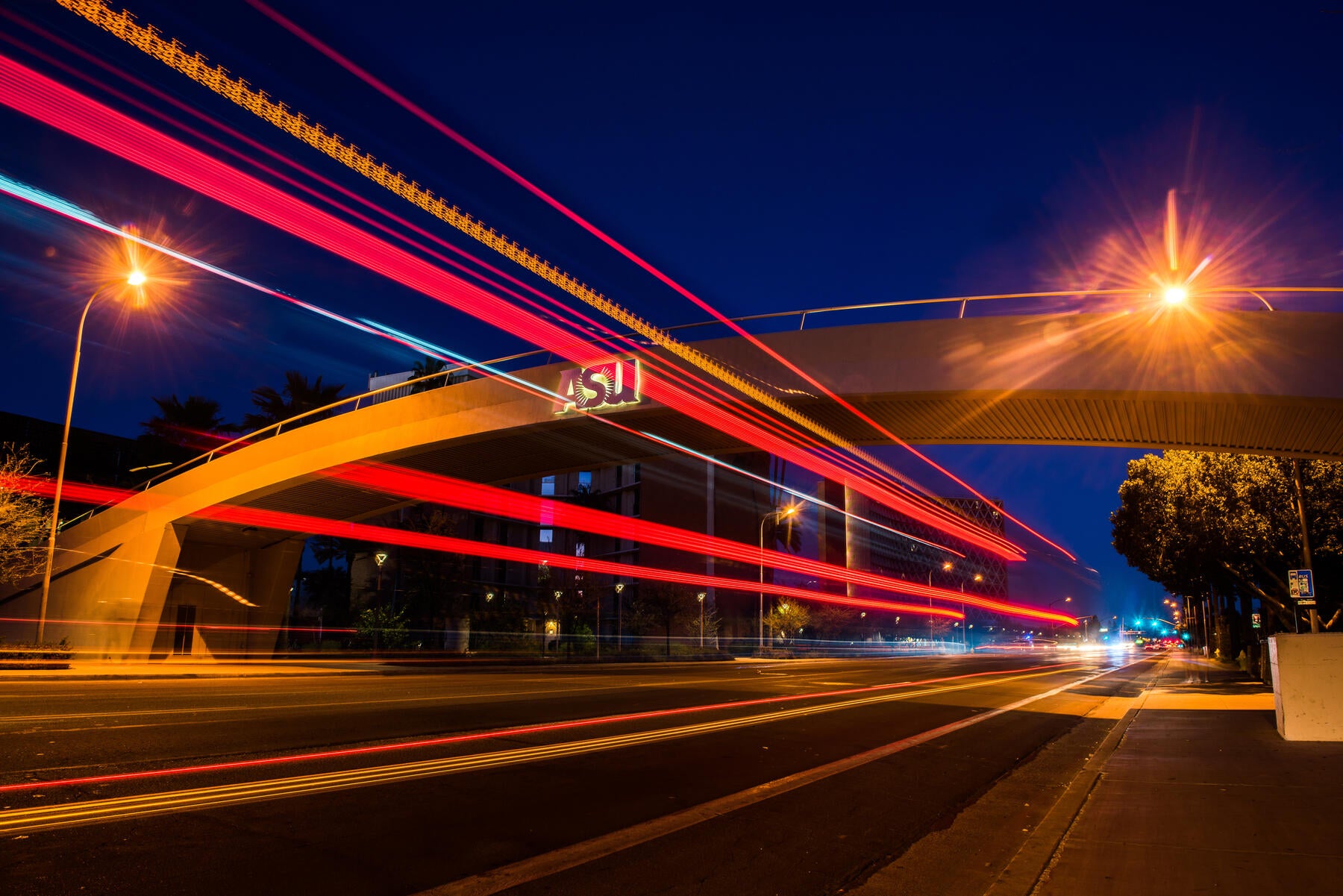
Cox Collaboratory supports ASU research that is ‘driving’ forward traffic solutions
If the thought of being able to find a parking spot on a busy day with an app as easily as it is to reserve movie tickets sounds appealing, you can rest assured you might never have to worry again about having to circle the block in frustration.
Thanks to a unique partnership between Arizona State University (ASU) and the Cox Connected Environments Collaboratory at ASU, researchers are using cutting-edge technology to create smarter traffic solutions in Arizona and beyond.
“Traffic and travel are things that will never go away and will therefore, always have problems to solve,” said Rachel Hayden, Cox Collaboratory project manager. “Thankfully, with rapid and continuous updates of technology available from both the Cox and ASU sides, it's fairly easy to prototype viable solutions in a timely manner, especially through partnerships such as this."
Last fall, the Collaboratory requested proposals from eligible ASU faculty, researchers and PhD students for innovative solution-based projects that drive impact. Healthcare, education or public safety projects that could leverage connected environments or Internet of Things (IoT) solutions were preferred. The Collaboratory then provided funding and other necessary resources to the selected proposals.
ASU researchers and funding recipients Dr. Junfeng Zhao and Dr. Yan Chen, both with the Ira A. Fulton Schools of Engineering, are tackling two different, yet equally important, challenges: connected autonomous vehicles (CAV) and intelligent parking systems. Their respective projects, both being tested and conducted at the Polytechnic campus, were selected by the Collaboratory team; a total of $430,000 funded all projects.

Project spotlight: Intelligent parking
The idea for the Intelligent Parking project started with frustration over finding a parking spot – something we can all relate to.
“Finding parking can be such a waste of time and fuel and so frustrating because it doesn't seem like we'll ever have enough parking spaces,” said Dr. Zhao, assistant professor and project lead. "Even if there are enough, sometimes it's still difficult to find available parking spots, especially at locations on campus, in the city or the airport. The whole idea of this project was that we wanted to utilize artificial intelligence (AI), computer vision and IoT techniques to better facilitate the user parking experience.”
Zhao’s Intelligent Parking prototype utilizes a Web User Interface (UI), a GoPro camera and computer vision to identify and sort available and occupied spots in a parking lot. Through the Web UI, users can choose available parking spots of their preference, or the interface can show them the closest available parking spaces to their location.
“When you select the spot you prefer, you’ll be taken to a custom navigation,” said Zhao. “We have designed a navigator through a Google API, with its own algorithm. Once you're parked, the camera sees that your parking space is now occupied and will visually tag it in the UI’s database in real time.”
Cox is not only funding the work of Zhao and his team of graduate students — with varied backgrounds in computer science, information technology and mechanical engineering — but also providing the communications infrastructure. Zhao anticipates Phase I of the project will be complete in early June.
While the team is currently working with a parking lot as a model, Zhao anticipates the next steps will be to help those parking on streets to find parking more efficiently. He also anticipates the ability to create a mobile app to do everything the test Web UI is now doing to track parking in an area.
“We're glad that we have this opportunity to work with Cox,” said Zhao. “With our working prototype, we are currently discussing the protection of this project’s IP, and even potential opportunities for commercialization once it’s complete.”
Project spotlight: CAV
Assistant professor Chen and his team of two graduate students have been focused on the intra-network communication between autonomous vehicles since the beginning of the calendar year. Ideally, in the near future, Chen’s work will also focus on the vehicles’ control and communications with their respective surrounding urban infrastructures.
Through funding from Cox, the goal of this first phase of Chen’s project is to enable autonomous vehicles on the road to be able to communicate with one another. This communication will allow the vehicles to maneuver together in sync, with the overall result expected to be improved traffic safety and efficiency.
“Currently we are using state of the art communication technology provided by Cox, over a private, local network,” said Chen. “The three test vehicles we’re working with — each about the size of a large, wide skateboard — use advanced communications over this network that functions with high-speed, high-capacity and low latency (delay), very similar to a 5G network.”
Chen intentionally sought out the opportunity to work with the Cox network because, according to him and his own testing, other competitors were not providing true 5G network capabilities.
Chen and his team will be working on this first phase of the project likely through the end of summer.
But their plans don’t end there.
“We’d like to get the vehicles communicating with their surrounding environments, using built-in or attached sensors,” said Chen. “That would allow us to do more advanced driving and maneuverability tasks.”
The research being conducted by Zhao and Chen has the potential to revolutionize the way we travel and park in our cities. Courtesy of the ASU Cox Collaboratory partnership, a future with safer, smarter traffic and creative parking solutions is getting closer every day.